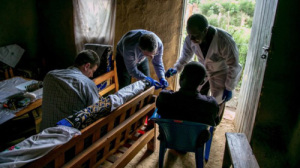
Israeli Scientists Lead the Search for Ebola Cure
Israeli Scientists Lead the Search for Ebola Cure
August 8, 2014
The Times of Israel — To most, the sweeping outbreak of Ebola in West Africa was an unexpected shock. To virologist and global leader on the cure for Ebola, BGU’s own Dr. Leslie Lobel, this was bound to happen.
“It is a result of the fact that the world has fallen asleep when it comes to fighting infectious diseases. There has not been enough surveillance or development of expertise to control infectious diseases since the 1970s,” says Dr. Lobel, who has been studying and trying to fight this disease for 12 years.
Lobel believes that Ebola came from bats drooling or defecating on something a human came into contact with. He blames, in part, globalization and global warming for disturbing the lifestyle of bats in West Africa, causing them to leave their niche habitats and come into contact with humans.
Dr. Lobel and his co-principal inevstigator, Dr. Victoria Yavelsky, have been working closely with the Ugandan Virus Research Institute. They take at least five trips to Uganda a year and work one-on-one with Ugandan Ebola survivors.
Dr. Lobel has become very close with many of his patients, having spent 12 years with some of them.
Unfortunately, survivors of serious ailments such as Ebola are ostrocized in West African nations.
“They feel like pariahs. Many of them have lost their jobs because they survived the disease,” Lobel says.
Lobel and his team are also in close contact with the U.S. military. The military provides high containment labs for Lobel to work in since Israel has none.
“First of all, high containment labs are very expensive to operate. And second of all, there is the security issue here in the Middle East. Working with Ebola here is just asking for trouble.”
Dr. Lobel uses these survivors to devise a way of conferring long-term immunity against the disease through the use of human monoclonal antibodies.
The team’s goal is to develop a passive vaccine composed of preformed components of the immune system, which would provide immediate protection against the virus.
In other words, Dr. Lobel is attempting to harnesss the antibodies of survivors and use them to cure Ebola.
This treatment is without a doubt the most promising and the best way to quickly treat Ebola patients.
“This would be much quicker than the active vaccine that the U.S. military has already produced and shown effective in monkeys,” says Lobel. “An active vaccine takes about a month to take hold.”
Easier said than done.
Dr. Lobel is sure the cure is close. It may not be immediate, by Lobel’s team believes it is only a few years from finding the solution.
Dr. Lobel is the only Israeli of a 15-member institution cosortium funded by a $28 million grant from the National Institutes of Health to eradicate Ebola.




